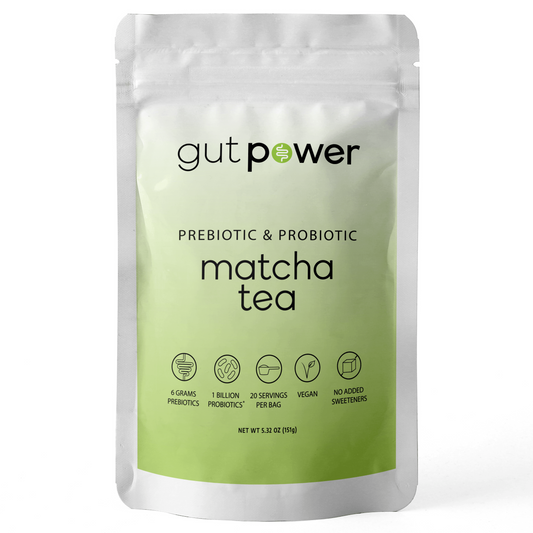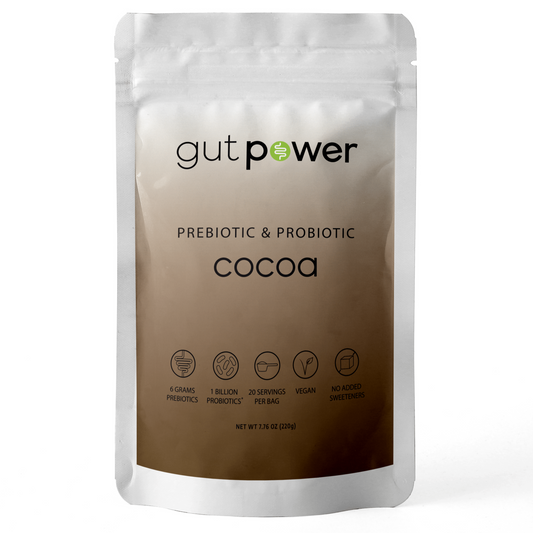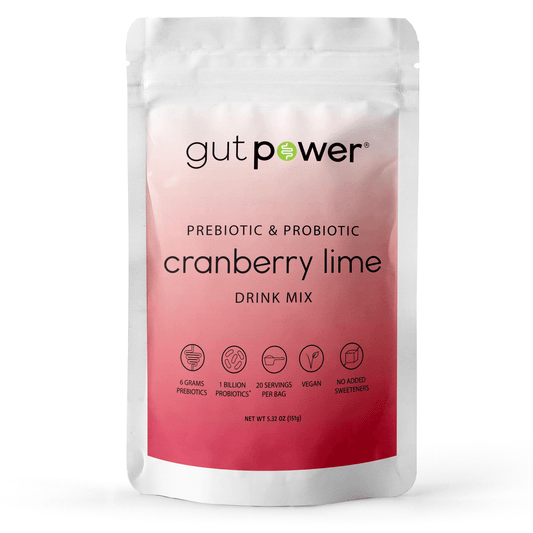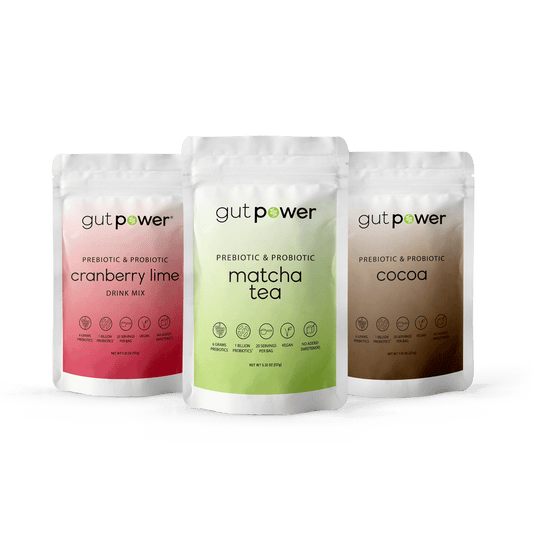Having trouble going number two? “Drink more water!” and “eat some prunes!” might sound familiar -- the internet is chock-full of supposed constipation-relievers. With all the suggestions out there, you may be wondering…do probiotics help you poop?
Discovering the root cause of your constipation is key to finding the best solution for you. That’s where probiotics and prebiotics come into play.
First, let’s rewind and start with the basics.
What is Constipation?
Constipation is defined as “a disorder in the gastrointestinal tract, which can result in the infrequent stools and/or difficult stool passage with pain and stiffness” (1). More simply put -- pooping less often or experiencing painful straining during pooping may mean you’re constipated. Oh joy!
Symptoms of constipation include:
- Incomplete stools (feeling like you haven’t gotten a full bowel movement out)
- Difficult stool passage (feeling stiffness or pain when pooping)
- Infrequent stools (not being able to poop very often)
If you’ve had these symptoms for more than 6 months on a regular basis, you may have chronic constipation.
So now we know what exactly constipation is -- but why are your poops looking like a rock pile in the first place? Let’s look at some root causes of constipation.
What Causes Constipation?
You’ve probably heard about common lifestyle-related causes of constipation, like not drinking enough water or eating enough fiber. But if you’ve got the lifestyle component down pat and you’re still having trouble, your constipation might be stemming from something else.
That something else could very well be dysbiosis - an imbalance of the bacteria in your microbiome. Hold on folks, we’re getting science-y for a second here:
The term microbiome refers to the collection of microorganisms (like bacteria) living in your gut. Don’t freak out at “microorganisms” -- it’s normal and healthy to have bacteria living within your gut!
The bacteria in your gut help the body regulate the immune system, digest food, and even create vitamins. Helpful kinds of bacteria are called, in layman’s terms, “good” bacteria.
But “bad” bacteria exist too. Too much bad bacteria in your gut can wreak havoc on your digestion.
If you have more bad bacteria than good bacteria, you have an imbalanced microbiome -- which we call in fancy science terms, “dysbiosis.” Constipation may be a side effect of that imbalance.
If only there was a way you could push out bad bacteria and increase good bacteria, thereby rebalancing your gut microbiome...
Do Probiotics Help You Poop?
This is where probiotics for constipation come in. These healthy bacteria may help to (at least temporarily) improve the balance between good and bad bacteria in the gut.
So, do probiotics make you poop? Let’s find out.
What are Probiotics?
Probiotics definition: According to the World Health Organization, probiotics are defined as “live microorganisms which when consumed in adequate amounts as part of food confer a health benefit on the host” (2).
Essentially, this means that probiotics are good bacteria.
Probiotics can come in supplement or liquid form, and can also be found in certain foods.
How do Probiotics Work?
Swallow a probiotic capsule and you’ve just added millions of helpful bacteria to your gut microbiome. Awesome, right? But wait -- there’s more.
Consuming probiotics not only adds good bacteria to the gut -- it also helps to drive bad bacteria out (even better!), thereby working to balance your microbiome.
Given that an imbalance of bacteria in the gut microbiome may contribute to constipation, it follows that probiotics could be an excellent strategy for improving your constipation symptoms.
Let’s see what the research says.
Probiotics for Constipation: The Evidence
You might be hoping that using probiotics for constipation erases any semblance of the problem. Unfortunately, scientific data is mixed on whether probiotics help you poop.
Some research shows that probiotics for constipation can be incredibly helpful.
A study testing the effectiveness of probiotics for constipation found that patients consuming probiotics saw a 70% improvement in stool frequency and a 60% improvement in stool consistency! The sample size was rather small, however, at only thirty participants.
But other research shows that probiotics may be no better than placebo.
One study tested the effectiveness of probiotics for constipation symptoms in 75 people over 4 weeks. There was a control group who did not take probiotics and a group that consumed probiotics consistently.
After 4 weeks, nothing happened -- there were “no improvements in stool output, symptoms, or quality of life” in the group taking the probiotic. They concluded that probiotics for constipation were not productive in this case.
Because the research is so mixed, scientists assert that “the use of probiotics for the treatment of constipation condition should be considered investigational,” meaning its effectiveness is not completely confirmed (3).
Why is the research so contradictory? Well, it might be because studies examine different strains of probiotics.
Different probiotic strains have different effects --- so a probiotics’ productiveness may waver depending on what it is being used to treat.
Scientists call for more research on probiotic strains to be done so that we can confidently determine which strains are effective for constipation.
Ultimately, probiotics may be helpful for constipation, though current research indicates that they seem to be a bit of a gamble.
Prebiotics for Constipation
While probiotics for constipation are a bit of a coin toss, what about PREbiotics for constipation?
What are Prebiotics?
Prebiotics definition: According to the ISAPP, a prebiotic is a “substrate that is selectively utilized by host microorganisms conferring a health benefit” (4).
Put simply, prebiotics are food for the good gut bacteria already living in your gut, helping to increase counts of good bacteria and improve your health.
What is the Difference Between Prebiotics and Probiotics?
That one-letter difference between prObiotics and prEbiotics makes a world of difference. Probiotics are actual live bacteria, and prebiotics are the “fuel” they feed off of.
When you consume probiotics, you add live, beneficial bacteria to your gut microbiome. And when you consume prebiotics, you provide fuel to the probiotic bacteria living in your microbiome.
Adding good bacteria to an unbalanced microbiome is important -- but so is strengthening the good bacteria that already inhabits it.
How do Prebiotics Work?
Prebiotics feed your beneficial bacteria, allowing them to reproduce and multiply. Increased good bacteria in the gut can push harmful bacteria out and improve your digestion overall.
Other than increased counts of good bacteria and decreased counts of bad bacteria, benefits of prebiotics may include:
- Decreased inflammation
- Strengthened intestinal lining
- Elimination of toxins from your digestive tract
Prebiotics can come in supplement form or in certain types of food -- both of which can grant you these benefits.
So, prebiotics help to balance gut bacteria, just like probiotics. And because constipation may be related to an imbalanced microbiome, it makes sense to guess that they might soothe constipation.
Let’s check out the research before we jump to conclusions.
Prebiotics for Constipation: The Evidence
Unlike probiotics, research shows that prebiotics are consistently helpful for improving bowel regularity.
A meta-analysis (a study that examines results of several other studies) looked at results of 27 studies about prebiotics’ ability to improve constipation symptoms. It also inspected synbiotics’ ability to improve constipation symptoms, which are combinations of probiotics and prebiotics.
They found that prebiotics alone increase weekly stool frequency and improve stool consistency (no more lumpy poops!).
Combining prebiotics AND probiotics together may be the best bet of all. When combined, prebiotics and probiotics are referred to as “synbiotics.”Synbiotics, however, seem to be even more effective than prebiotics alone.
Most notably, synbiotics were shown to decrease whole gut transit time (the time it takes between eating your food and having a bowel movement) by 13.5 hours on average - meaning you could dramatically ramp up your stool passage frequency.
Synbiotics also were also shown to improve stool consistency and decrease bloating and pain with stool passage.
When it comes to specific prebiotics that may be helpful, one prebiotic superstar stands out among the bunch -- Sunfiber.
Sunfiber is repeatedly shown in scientific studies to reduce constipation, increase regularity (meaning you’ll go more often!), reduce abdominal pain with stool passage, and soften stools (5). Even low doses can have these effects.
One study asserted that Sunfiber (called “partially hydrolyzed guar gum” in the science world) is a “credible candidate” to be a “single comprehensive solution for overall maintenance of proper digestive health” (6). That’s some pretty high praise!
Clearly, the combination of prebiotics and probiotics for constipation is a winner, especially when using the Sunfiber prebiotic.
Takeaway: Do Probiotics Help You Poop? Yes -- But Use Prebiotics, Too
Probiotics can, indeed, make you poop. But research shows that the best results may be gained by combining prebiotics WITH probiotics for constipation. This prebiotic and probiotic combination may be especially helpful when it uses the Sunfiber prebiotic.
Prebiotics are shown to improve stool frequency and consistency, and when combined with probiotics may provide even more benefits for constipation.





